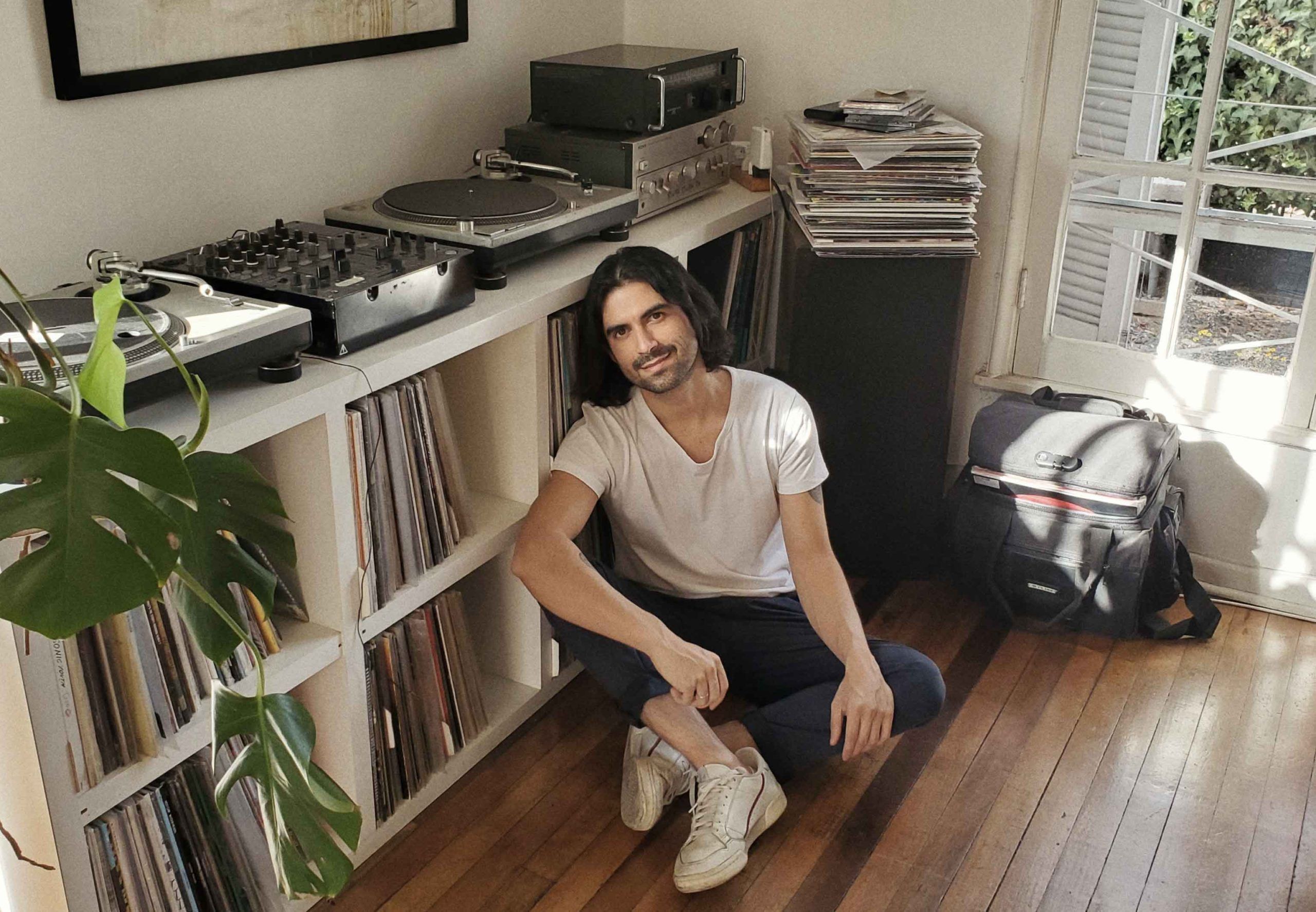Because of the pandemic we are all simultaneously going through, at a distance, in different places and different situations, as the South Plug team, we wanted to share the reflections that guest musicians, and we have had during these months. We have seen how, for the first time at a global level, we have been connected and affected by the same factor, leading to reflections that question the lifestyles we had been driving before the sanitary crisis.
Amanda Mussi, DJ, and producer of electronic music from Sao Paulo, Brasil, tells us that this reality has made her learn more about herself and change some of the ways she used to do things. She feels that, somehow, she is learning to live in a new reality: “what we have to do now is go on with what we have, do what we know how to do and what we can. No one was prepared for this, and we are going to learn to survive in different ways. It has called my attention how unprepared we are for this kind of catastrophes and how this pushes us to reinvent ourselves as professionals and face our demons”.
“In my case, I am 35 years old, and I have never seen things change as abruptly as in the last six months”, tells us Nico Castro, Chilean producer, and DJ. “The truth is, today, I am unable to predict anything. I go through days in which I think this will all be for the best, and others in which I think quite the opposite”.
Confinement has, without a doubt, brought to light some of humanity’s most profound flaws, proving that what’s urgent is not just survival, but the right way of surviving and coexisting. All of this has generated a lot of frustration and fear, but also a sense of understanding among people. We believe here lies the challenge, the motivation, the change. In the music scene, we have witnessed generosity gestures: musicians sharing their art freely on social media, managing to teach others, sharing tools, and connecting from all over the country and the world to support each other. Collaboration will be necessary to lift us after this.
“In our disciplines, there is a necessity to survive, due to scarcity, which makes a sort of compulsory individualism, almost cannibalistic,” shares Nico Castro. “The cake is too small to share, and it seems logical to want to save a piece for myself and those close to me. And this is far from ideal: clearly, the solution to get through this is not there. Today, to make it work, a collaboration between all of us is more necessary than ever”.
The crisis, for us as the South Plug Team, has not altered our way of working that much, and we continue to give and share content as always. However, we have started to rethink our platform and nurturing from the visions of other artists, collaborators, and the audience itself, which participates more and more every day. As a team, we have focused on taking care of our relationships, giving each other time, listening to our different points of view, and suggestions. We have been trying and making mistakes. We are doing our best to go through what we are experiencing with honesty towards each other without masks.
“This moment has a negative and a positive aspect,” tells us Laly Brum, electronic music producer, and director of the record label Pulse in Uruguay. “The negative aspect is very negative, but so is the positive, and it brings new opportunities. To be able to observe what is here, what exists once our routines, work, every day fast pace stop, and we find ourselves. Everything is enhanced; it is a great opportunity to connect, to change our lens, and to bring out the best in ourselves”. These are the thoughts of Laly, who has spent the last weeks of her quarantine at a house on the Uruguayan mountain range and has been able to resume a yoga practice and connect with nature.
“Personally, it took me two weeks to be productive again,” says Amanda Mussi. “Each person has its way of reacting emotionally to situations as difficult as this one, and I am focusing on keep making music for the dance floor, for dancing, and my intensity changes every day. There are days in which I compose with more energy, others more calmly. The anxiety about getting back to the floor makes me want to create a lot of new music so that, when we can go dancing again, I have a lot of new material to bring to the table. I am certain that from this situation, new and different things will emerge. The artist is still important, even if we are not able to have events. I think any way we manage to express ourselves can bring a little happiness to others who are also in isolation”.
Making the most of the time on lockdown and social distancing, being productive, and seeing the quarantine as an opportunity is something that many others feel as social pressure. Regarding this, Nico Castro talks about producing in a more paused manner, listening to his rhythms and needs. “I have tried not to put pressure on myself. There are days in which I have sat, and something good has come out, creatively speaking. But there are other days in which I don’t want to get out of bed. Surviving this doing what we do is difficult enough to, on top of that, be brilliant. That’s why I am taking things day by day, and this exercise has brought some good surprises. For instance, I have been able to create music at times I couldn’t before, like in the mornings. Plus, it has been a great escape to the storm of news, opinions, and how overwhelming reality can be”, he says.
Regarding the industry, and how much we are willing to give in those of us who are in it, we believe the most significant effect is on teams and how they add up. We see this as a moment to look beyond the frontiers that surround us. The free digital connectivity we face and the possibility that our music and live sets are heard worldwide is an opportunity to stop thinking about the limits in our work. We need to open our minds and see our projects as something totally exportable and economically sustainable, which must seek its way internationally: maybe in other places, there are niches in which our creations fit. It is essential that we learn to get out of the comfort of the local scene, but are the conditions right? How is uncertainty about what is going to happen experienced in the Latin American music industry? Many agree with thinking about the economic situation and not being able to work as the primary concern.
“I don’t think the future will bring a drastic change in the music industry. Maybe we are experiencing a change in means of consumption, and surely many interesting projects will rise from this. There is no doubt in stating we are already suffering the effects of an economic and social crisis that will be hard to recover from. Our sector was the first to stop its activity and probably be the last one to start functioning again. The reactivation process in our sector seems far away, and that generates uncertainty and worry. As a producer, I believe it is convenient for musicians to keep the legal clauses on their contracts. I think to ask artists or their agents to be flexible or to return their deposits only contributes to making the situation more precarious. What we are living has made me seek other alternatives for the development of new projects, and that brings me hope; I am doing something”, tells us Laly Brum.
“It is difficult to make a proper analysis of the impact this is going to have in our reality, which is very basic and amateur in the industry,” Nico Castro says. “You live day by day, and it is hard to think ahead. I do think we could have some State support, but it is a fantasy, especially with a Government like the one we have. By choosing to make a living out of this (be it as an artist, producer, or promoter), we’ve had to give in constantly. I don’t know how much more we can do this”.
“I believe at the time the big brands and companies, in sectors like ours with no regulation regarding salaries, should support us, and there could be a pattern of artistic insurance, or something similar for independent workers,” Amanda Mussi states. “What concerns me the most is the economic aspect, obviously, and my country’s situation with such an incapable president (Bolsonaro) leading it. And there is the uncertainty in not knowing when we are going to have our events back”.
Though the scenario is looking bleak for the industry, we believe this year will be necessary regarding the kind of pieces that will be created, no matter the artistic discipline. In electronic music, it will not be any different. These pieces will come with a strong message, from the most profound source, and about the most in-depth experiences. Resilience is born from adversity, and creativity from scarcity.
“To create, at least over here in a third world country, is a challenging task,” Nico Castro comments. “If it is hard in normal conditions, during times like these, it is truly a great deed. It is a matter of comparing ourselves with other countries, in which working in culture is even rewarded. Here, almost no one can afford the luxury of living from his or her artistic creations. At the same time, this precise anguish has been the motor to create wonderful things. We have learned to create in adversity, and that resilience I believe will show once again in these moments of lockdown”.
“At a musical level, there is more experimentation going on,” Laly Brum believes, “and without a doubt, this affects in every way, but an opportunity and space for creating new things, for exploring an unknown potential and generate a new exchange in this space, is presenting itself.”
As a team, we have decided to hold tight to our mission, Expression of a Region (Expresión de una Región). From this, we have opened ourselves to explore every possibility that presents itself in this new order: we want to keep on doing what we do, as strong as ever. The challenge for us has been constant, it has not ceased from the beginning, and though the pandemic has taken us all by surprise, somehow in this industry, there is always some improvising and surprise, inherent to art. However, to work consistently, insisting, and believing in what we do and knowing how to react are the tools that have worked better for keeping strong while facing this crisis. We are open to any way of expression. These can transform, but not the need to express, which is permanent. What now? Now we are called to keep exploring this road, personally and collectively.

